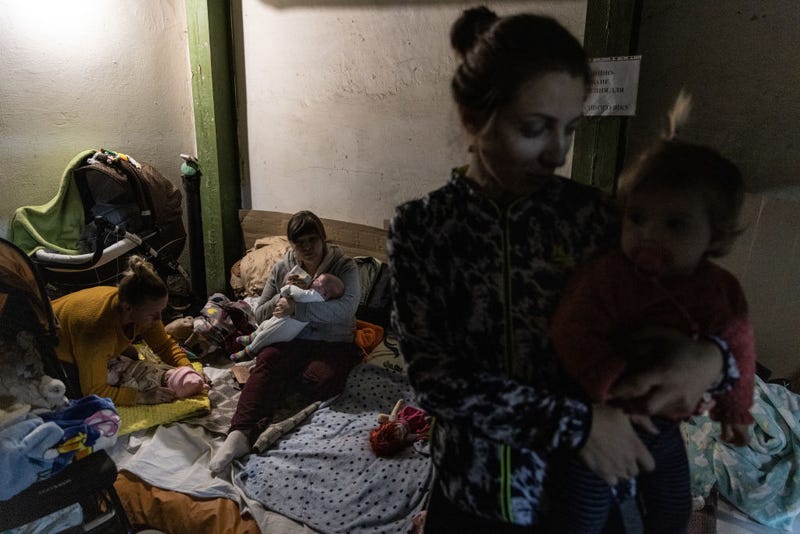
As the Russian Federation continues to attack Kyiv, Ukraine’s capital city, child cancer patients are going without treatments and sheltering from bombings in the basement of a hospital.
“These children suffer more because they need to stay alive to fight with the cancer – and this fight cannot wait,” said Dr. Lesia Lysytsia over the phone from the basement of Okhmatdyt, a Kyiv children's hospital, according to NBC News.
Some children have access to only a basic form of chemotherapy right now as other treatments have been interrupted, said the outlet. This has led to concerns that the children could relapse or grow sicker.
“Our patients, they will die,” if the interruption continues, Lysytsia said.
Russia invaded Kyiv and other Ukrainian cities late last week. While Ukrainians have been able to hold the attacks back, there have been over 100 civilian fatalities so far, including at least 14 children. Ukrainian officials said that Russian forces were hitting targets where children could be.
Heavy gunfire in Kyiv Saturday claimed the life of a 6-year-old boy and injured others said Serhii Chernysuk, a doctor at Okhmatdyt hospital, according to CNN.
Child victims of the battles are also treated at Okhmatdyt. Many of the patients have been moved underground, there mattresses and pillows have been laid out on the floor, according to NBC. In addition to the sounds of war from above and low supply of chemotherapy treatments, the hospital also has dwindling supplies of necessary medications, as well as food and water.
“We will calculate how many people or soldiers have died in attacks, but we will never calculate how many patients weren’t diagnosed of a disease in time, how many patients died because they didn't receive treatment,” Lysytsia said of the situation. “It's an epic amount of people.”
Already, some children’s blood counts grew so low and supplies so short at Kyiv Regional Oncology Center that doctors started doing blood transfusions from parents to the children, said Julia Nogovitsyna, program director at Tabletochki, the country's largest child cancer charity.
At the same time, evacuating the sick children while Russians continue to attack also presents dangers.
“I don’t even know if it’s safe to go outside. It’s possible they go out near the hospital and they’ll be attacked,” Lysytsia said.
Even so, Ukrainian doctors are working to get patients to a medical center in Lviv in western Ukraine, where there are more supplies and conditions are safer, according to Julia Nogovitsyna, the program director at Tabletochki, the country's largest child cancer charity. They hope to get some of the children most in need to Poland.
On Monday, 14 children departed from Kyiv on a bus headed to Lviv. Although the trip typically takes three to four hours, after eight hours, they had still not arrived.
There have been challenges too, according to Nogovitsyna. She said tensions at the border have prompted refugees to throw rocks at cars with sick children inside or even to hit the vehicles.
Another bus of 20 children and a car with a 37-week-old baby girl who was born with leukemia are also expected to arrive in Lviv by Tuesday.
“She is the most difficult one out of all patients,” said Nogovitsyna, of the baby. “I don’t know how she will survive this.”
Even though Lviv is safer than Kyiv, bomb sirens still wail over the city every few hours, said Dr. Roman Kizyma, the lead pediatric oncologist at the Western Ukrainian Specialized Children's Medical Center in the western Ukrainian city.
Staff members have tried to make the siren sounds into a game for younger children. However, most over age 10 remain angry and scared, said NBC News.
“It is traumatizing,” said Kizyma, who is also an officer in Ukraine’s reserve military.
He said that since children may die if they leave Lviv, he and the hospital staff are determined to stay. They are prepared to take up arms against Russian invaders.
“We will stand here until the last moment,” he said.
“My worst fear is that I won't be able to help them anymore,” said Nogovitsyna, who added that she has spent days crying. Even so, she is determined to keep them safe.
Lysytsia, who is camped out in the Okhmatdyt with her family and patients, said she will also stay as long as she needs to.
“We will do everything that is important for our patients,” she said, “and we will stay until the end.”
LISTEN on the Audacy App
Sign Up and Follow Audacy
Facebook | Twitter | Instagram